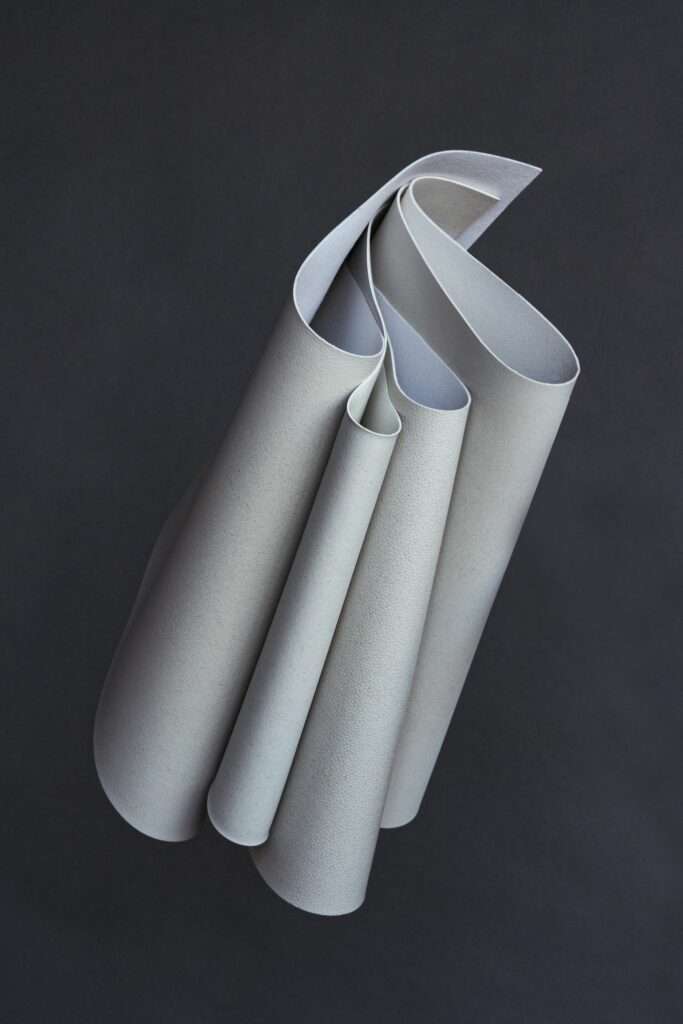A new collaboration between Lenzing and Natural Fiber Welding aims to help the fashion industry replace conventional leather with sustainable alternatives.
Lenzing Group, a global leader in sustainably produced fibers, has partnered with Natural Fiber Welding Inc. (NFW) to provide Tencel branded fibers as a sustainable alternative to leather. The Tencel Lyocell and Modal fibers are derived from sustainable wood sources and are produced through environmentally responsible processes. The collaboration will showcase the Mirum x Tencel collaboration and its sustainable alternative for leather applications during the international leather fair, Lineappelle, taking place this week in Milan.
“This partnership is a perfect example of how the combination of our sustainable Tencel fibers and innovative materials like Mirum can go beyond traditional textiles,” Birgit Schnetzlinger, Head of Business Development Functional Wear and Footwear, Global Textiles Business at Lenzing AG, said in a statement.
“With innovation at heart, there are infinite possibilities for application of the new material. Tencel fibers used as backer not only increase the level of transparency and traceability of Mirum, but also enhance comfort — and with a very low carbon footprint,” Schnetzlinger said. “We are confident that the versatile material will be loved by supply chain partners and brands across footwear, fashion apparel, accessories, furniture, and even automotive industries.”

Mirum is an eco-friendly material that is free from plastic and made from natural rubber, plant, and mineral pigments, plant-based oils and waxes, and an all-natural fabric backing.
Unlike traditional leather alternatives that use polyurethane binders, Mirum uses natural rubber and plant oils for binding. NFW uses a diverse range of natural ingredients like biobased charcoal, clay, cork powder, rice hulls, coconut fibers, recycled denim, or seaweed to develop colors or add visual interest.
Products made with Mirum can be recycled into new Mirum or ground up and returned to the earth, while Tencel fibers are compostable and biodegradable, making the finished products completely circular.
Tencel is the flagship brand under The Lenzing Group that covers textile specialty product fiber offerings. The brand has been driving the evolution of fiber solutions for the apparel and home textile segments through several industry-first innovations and environmentally responsible production processes; Tencel Lyocell fibers are versatile and can be combined with a wide range of textile fibers to enhance the aesthetics and functionality of fabrics. The fibers are traceable through Lenzing’s Fiber Identification technology, which allows for full transparency of the fiber materials used during the production process.
The partnership between Lenzing and NFW is expected to help designers and brands reduce their environmental footprint while expanding their creative palettes.
The fashion industry has been facing intense pressure from consumers and regulatory bodies to reduce its environmental footprint. In recent years, there has been a growing awareness of the negative impact of fashion on the environment, including pollution, greenhouse gas emissions, and waste.
The industry is responsible for approximately ten percent of global carbon emissions, and the production of leather, in particular, is a significant contributor. According to the World Wildlife Fund, livestock farming accounts for 14.5 percent of global greenhouse gas emissions, and the leather tanning process is responsible for a significant amount of water pollution.

According to a survey by Nielsen, 73 percent of global consumers would change their consumption habits to reduce their environmental impact. The demand for sustainable fashion is expected to continue to grow, with the global sustainable fashion market projected to reach $9.81 billion by 2025, up from $6.35 billion in 2020.
“At NFW, we believe that plant matter is the only material that can scale to replace plastic. Since its inception, Mirum has been engineered to benefit our planet,” Oihana Elizalde, Vice President and General Manager of Mirum at NFW, said in a statement. “By adding fabrics made of Tencel to Mirum we can enhance material transparency and traceability while guaranteeing comfort and great hand feel on the skin.”
According to Elizalde, one of the best examples of the collaboration is the Allbirds Plant Pacer, which was released last fall. The shoe’s upper is made with Mirum and lined with Tencel.
The new partnership comes as Lenzing recently partnered with Swedish label Fillipa K on a novel material developed in partnership with Södra and Riopele. It’s made from a combination of textile waste and wood cellulose, for a textile Filippa K called a “revolutionary pilot fiber.”
Related on Ethos:


